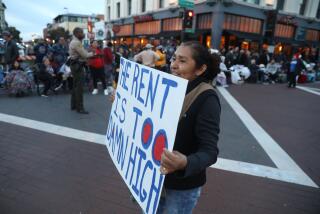Outside opinion: austerity, guns and affirmative action
The great thing about individual states, as well as separate countries, is that they’re all laboratories of government conducting experiments in social and economic policies -- and in the marketplace of government ideas, the most successful ones can be copied by everybody else. That’s why the United Kingdom’s experiment with austerity should be of great interest to Americans as we approach the presidential election. I’ve seen several commentators weigh in on this, but one of the most clear-headed analyses can be found today on Al Jazeera.
- Dean Baker, co-director of the Center for Economic and Policy Research in Washington, demonstrates why the U.K. austerity program -- an idea paralleled in the U.S. by plans from Republicans in Congress, not to mention GOP presumptive presidential nominee Mitt Romney, to sharply curtail government spending in order to reduce the deficit -- has been a monumental failure. There’s one important point Baker doesn’t mention: In Great Britain, spending cuts were combined with tax increases, while U.S. Republicans aim to reduce taxes and spending at the same time. But the program has failed on nearly every measure, with the economy pushed back into recession and unemployment rising. The conclusion is the same one most of the world reached during the Great Depression, which is that government spending can help pull a country out of the economic doldrums. With the U.S. recovery at its nascent stage, now isn’t the time to pull the plug.
Other provocative punditry from around the globe:
- Commentator Walter Rodgers signs off as a weekly columnist with the Christian Science Monitor with a doozy: His conclusion that Stand Your Ground laws such as the one in Florida that is allowing neighborhood vigilante George Zimmerman to claim self-defense in the killing of teenager Trayvon Martin actually make people less safe, not more. “Many Americans have been duped into believing they, too, can be Clint Eastwood with a .44 Magnum. They don’t realize Hollywood-style vigilantism is a universe apart from real life.”
- It’s a bit of a stretch, but USA Today columnist DeWayne Wickham makes a case that the trial of former North Carolina Sen. John Edwards for alleged campaign spending violations in the 2008 presidential race can be compared to the famous Scopes “monkey trial” of 1925 -- both are examples of prosecutions driven by American puritanism. Maybe not, but reading Wickham’s short piece beats reading news accounts of the sordid details of Edwards’ best-forgotten trial.
- The always-controversial Ward Connerly, former University of California regent and outspoken opponent of affirmative action programs, has an op-ed in the Washington Times that lays out a clear, if slightly off-kilter, argument for why President Obama is a hypocrite on the issue of fairness: He believes in tax policies in which millionaires would pay the same tax rate as everybody else, but when it comes to hiring or admission preferences based on race he’s willing to turn a blind eye. What Connerly has never really understood about racial preferences, and which he again fails to address in his op-ed, is that they’re intended to make up for historical unfairness aimed at minorities, with the ultimate goal of eliminating preferences in the future by raising their educational and employment prospects. Moreover, students of all races benefit from campus diversity.
- With Connecticut’s abolition of the death penalty and trial of Norwegian mass murderer Anders Brievik in the headlines, Washington Post editorial writer Charles Lane lays out his case for why capital punishment, at least in some cases, is a good idea. It’s a good summary of the hangman’s point of view, but a pretty flawed argument. Lane give a little too much credence to Brievik’s statement that if Norway had a death penalty, he might have been deterred from his killing spree -- believing anything that comes out of this deranged propagandist’s mouth is unwise. He also faults the Connecticut Legislature for failing to retroactively apply its ban on the death penalty to the 11 inmates currently on that state’s death row. But that’s just an argument for states to adopt laws such as the initiative heading for Caliifornia’s ballot in November, which would automatically convert the sentences of death-row inmates to life without the possibility of parole. In the end, Lane’s only real argument is that the urge to execute killers is “one of humanity’s oldest and most persistent moral intuitions.” So is human or animal sacrifice to propitiate the harvest gods. We’re evolving, Charles.
ALSO:
Dodgers sale closes; McCourt chapter endsFacebook share could save lives: Posting your organ donor status
News Corp. admits errors as panel calls Rupert Murdoch unfit leader
Follow Dan Turner on Facebook
More to Read
A cure for the common opinion
Get thought-provoking perspectives with our weekly newsletter.
You may occasionally receive promotional content from the Los Angeles Times.






